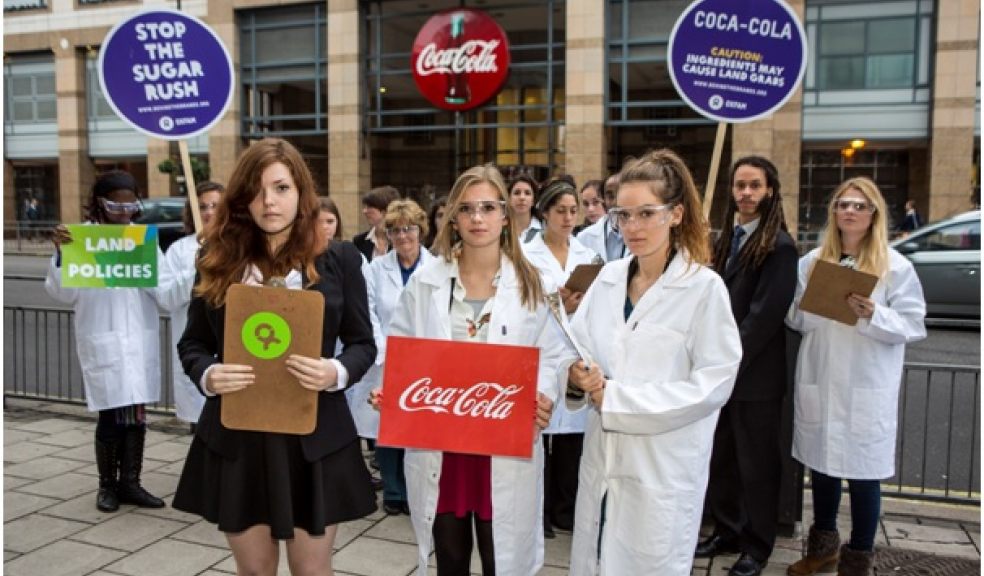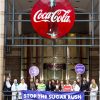
Campaigners from Exeter lobby Coca Cola in London
Campaigners from Exeter lobbied giant firm Coca Cola at its UK Head office in London yesterday, calling on the company to make sure our favourite food and drinks are ethically produced.
Katherine Hawkins, Fiona Bell and Emma Anderson, all aged 20 and living in Exeter, travelled to London to join other campaigners across the country at Coca Cola's head office in Hammersmith, west London to ensure that poor people are not being forced off their land and out of their homes to make way to grow crops for Coca Cola products.
Katherine, Fiona and Emma spoke to workers at Coca Cola about the threat of land grabs for poor people in developing countries who produce sugar for UK products such as soft drinks.
A new report by Oxfam called, Nothing sweet about it: How sugar fuels land grabs, shows how people are at risk of losing their homes and land in a rush to feed our growing appetite for sugar. The report links disputes of land with companies that supply sugar for Coca-Cola and PepsiCo products. It also highlights alleged disputes with British food giant ABF (Associated British Foods).
Oxfam is calling for the companies to tighten their supply chains so the ingredients they use in their products are not grown on land that has been grabbed from communities that depend on it for their survival.
Katherine Hawkins shared information about the practice of land grabs in the sugar supply chain as demand has soared worldwide.
"When I heard about Oxfam's campaign Behind the Brands I thought it was very exciting and creative and I wanted to be involved in the launch with big companies like Coca Cola and Pepsi involved. We want to make sure that Coca Cola know that they should address this on behalf of consumers and they have the power to make change happen."
Oxfam’s Chief Executive Mark Goldring said: “We all need reassurance that what we are consuming is not contributing to the world’s most vulnerable being evicted from their land without consent or compensation. Large corporations must take responsibility to ensure that their goods are not tainted by this scandal happening in remote places many miles from the board room.
“Associated British Foods, Coca-Cola and PepsiCo are in a prime position to stamp out land grabs by ensuring that the sugar they use is not grown on land that is taken against the wishes of the community. Their focus on this could transform the industry.”
Sugar production is predicted to increase by 25 per cent by 2020. The global sugar trade is worth around £29 billion. The world produced 176 million tonnes of sugar last year and the food and drinks industry accounts for more half of it.
While our increasing appetite for sugar has health experts ringing alarm bells, Oxfam says it has largely gone unnoticed that the sugar trade is also helping to fuel the problem of land grabs and disputes. 31 million hectares, an area 1.3 times the size of the UK, is already being used to grow our sugar, much of it in the developing world.
Land grabs are big deals where local communities that rely on the land are evicted without consent or compensation – often violently. Oxfam’s “Behind the Brands” campaign says that the world’s ten biggest food and drink companies lack strong enough policies to stop land grabs and disputes from featuring in their supply chains.
Oxfam has evidence of land grabs and conflicts in Cambodia and Brazil including:
- A fishing community in Pernambuco State, Brazil fighting for access to their land and fishing grounds, after having been violently evicted in 1998 to make way for a sugar mill. The mill provides sugar to Coca-Cola and PepsiCo. Many of the families are now living in slums of the nearest town and struggling to make a living.
- In Mato Grosso do Sul in Brazil indigenous communities are fighting the occupation of their land by sugar plantations supplying a mill owned by Bunge. Coca-Cola buys sugar from Bunge in Brazil but says it does not buy from this particular mill. The plantations have destroyed the forests that the people had relied upon for food.
- In Sre Ambel District in Cambodia, 200 families are fighting for land from which they were evicted in 2006 to make way for a sugar plantation. The plantation has supplied Tate & Lyle Sugars, which sells sugar to franchises that manufacture and bottle products for Coca-Cola and PepsiCo. The families’ lives have been devastated as they no longer have anywhere to grow crops or graze their livestock.
- ABF through their ownership of Illovo, Africa’s biggest producer of sugar cane, has also been linked in media reports to land conflicts in Mali, Zambia and Malawi.
Oxfam is calling on ABF, Coca Cola and PepsiCo to commit to zero tolerance of land grabs throughout their supply chains. They should publicly disclose who and where they source their commodities, publish assessments about how the sugar they purchase affects local communities’ land rights, and use their power to encourage governments and the wider food industry to respect land rights.
All three companies scored poorly or very poorly on their land policies in Oxfam’s Behind the Brands scorecard.
Coca-Cola is the world’s largest buyer of sugar and controls 25 per cent of the global soft drink market. Its portfolio of 500 brands includes Diet Coke, Fanta, and Del Valle juices.
PepsiCo controls 18 per cent of the soft drink market and has a portfolio of 21 brands including Pepsi, Tropicana, Doritos, Lipton Teas and Walkers
ABF is the world’s second largest sugar producer and the owner of popular brands such as Silver Spoon Sugar, Ovaltine, Kingsmill and Patak’s.















